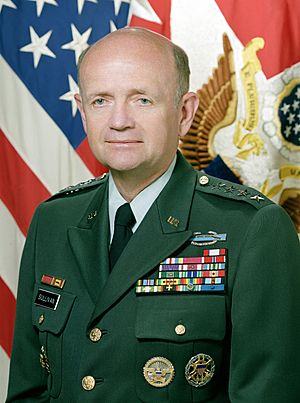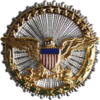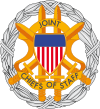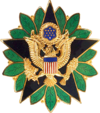Gordon R. Sullivan facts for kids
Quick facts for kids
Gordon R. Sullivan
|
|
|---|---|

Sullivan in 1992
|
|
| Born | September 25, 1937 Boston, Massachusetts, U.S. |
| Died | January 2, 2024 (aged 86) |
| Allegiance | United States |
| Service/ |
|
| Years of service | 1959–1995 |
| Rank | |
| Commands held | Chief of Staff of the United States Army 1st Infantry Division (Mechanized) 1st Brigade, 4th Armored Division 4th Battalion, 73d Armor Regiment |
| Battles/wars | Vietnam War |
| Awards | Defense Distinguished Service Medal Army Distinguished Service Medal (2) Defense Superior Service Medal Legion of Merit Bronze Star Medal Purple Heart |
| Other work | President, Association of the United States Army |
Gordon Russell Sullivan (born September 25, 1937 – died January 2, 2024) was a very important leader in the United States Army. He became a General and served as the 32nd Chief of Staff of the Army. This means he was the top military officer in the Army. He was also part of the Joint Chiefs of Staff, a group of senior military leaders who advise the President. For a short time, Sullivan also served as the acting Secretary of the Army.
After he retired from the Army, General Sullivan continued to serve his country. He was the president and chief executive of the Association of the United States Army for 18 years. This organization supports soldiers and their families. He also led the boards of Norwich University, The Army Historical Foundation, and the Marshall Legacy Institute.
Contents
Early Life and Education
Gordon Sullivan was born on September 25, 1937, in Boston, Massachusetts. He grew up in a nearby town called Quincy. In 1959, he earned a Bachelor of Arts degree in history from Norwich University. After graduating, he became a second lieutenant in the Army's Armor branch.
Sullivan continued his education, earning a Master of Arts degree in political science from the University of New Hampshire. He also completed special military training courses. These included the United States Army Armor School, the Command and General Staff College, and the Army War College.
Military Career Highlights
General Sullivan had a long and distinguished career in the Army. He served in many important roles around the world. His overseas assignments included four tours in Europe, two in Vietnam, and one in Korea.
- Early Assignments:
* After a tour in Korea (1961-1962), he volunteered for service in Vietnam. * He took a special course to become a military advisor. * He also learned the Vietnamese language. * His first tour in Vietnam began in January 1963.
- Leadership Roles:
* He was the Assistant Commandant at the United States Army Armor School in Kentucky (1983-1985). * He served as Deputy Commandant at the United States Army Command and General Staff College in Kansas (1987-1988). * He commanded the 1st Infantry Division (Mechanized) at Fort Riley, Kansas (1988-1989). * He was the Deputy Chief of Staff for Operations and Plans. * He became the Vice Chief of Staff of the United States Army (1990-1991).
General Sullivan's most important role was serving as the 32nd Chief of Staff of the United States Army. This made him the highest-ranking general in the Army. He was also a member of the Joint Chiefs of Staff. As Chief of Staff, he helped the Army change after the Cold War ended. He guided the Army to become ready for new challenges. In 1993, President Bill Clinton also asked him to serve as the acting Secretary of the Army.
General Sullivan retired from the Army on July 31, 1995. He had served his country for more than 36 years. A military march called "Architect of Victory" was dedicated to him when he retired.
Life After the Army
After retiring, General Sullivan continued to be very active. He co-wrote a book called Hope Is Not a Method (1996). This book talked about the big challenges of making the Army smaller and changing it after the Cold War.
He held leadership positions on many important boards. These included the board of trustees for Norwich University, the Army Historical Foundation, and the Marshall Legacy Institute. He also advised groups like the MITRE Army Advisory Board. From 1998 to 2016, he was the President and CEO of the Association of the United States Army. This group helps support soldiers, veterans, and their families.
General Sullivan was also an advisor for Spirit of America. This organization helps Americans serving abroad and the local people they work with.
For his amazing military career and his work with the AUSA, Sullivan received special honors. In 2003, he was given the Sylvanus Thayer Award by the United States Military Academy. In 2016, he received the AUSA General George Catlett Marshall Medal, which is the highest honor from the Association of the United States Army.
Working on Climate Change and National Security
General Sullivan was the first chairman of the CNA Military Advisory Board. This group of retired generals and admirals studied how climate change could affect national security. The board's important report, "National Security and the Threat of Climate Change," introduced the idea of climate change as a "threat multiplier." This means it can make existing problems worse.
In 2007, General Sullivan said it was time to stop debating climate change and start acting. He compared the risk of climate change to military decisions. He said, "We never have 100 percent certainty. We never have it. If you wait until you have 100 percent certainty, something bad is going to happen on the battlefield." He believed that even without complete certainty, action was needed to prevent serious harm.
He also compared climate change to the nuclear threat during the Cold War. He explained that with climate change, the challenge is to stabilize things, like carbon in the atmosphere. He emphasized that we must act to avoid the worst effects.
Personal Life and Passing
Gordon R. Sullivan was married to Miriam Gay Loftus, who passed away. He later married Lori Boyle and lived in Falmouth, Massachusetts. He had three children and three grandchildren. General Sullivan loved to read and was very interested in history.
Gordon R. Sullivan passed away on January 2, 2024, at the age of 86.
Awards and Decorations
General Sullivan received many awards and decorations for his service. These show his bravery and dedication.
 Combat Infantryman Badge
Combat Infantryman Badge Office of the Secretary of Defense Identification Badge
Office of the Secretary of Defense Identification Badge Joint Chiefs of Staff Identification Badge
Joint Chiefs of Staff Identification Badge Army Staff Identification Badge
Army Staff Identification Badge
 Defense Distinguished Service Medal
Defense Distinguished Service Medal- Distinguished Service Medal with oak leaf cluster
 Defense Superior Service Medal
Defense Superior Service Medal Legion of Merit
Legion of Merit Bronze Star
Bronze Star Purple Heart
Purple Heart- Meritorious Service Medal with oak leaf cluster
 Joint Service Commendation Medal
Joint Service Commendation Medal- Army Commendation Medal with oak leaf cluster
 Army Achievement Medal
Army Achievement Medal Meritorious Unit Commendation
Meritorious Unit Commendation- National Defense Service Medal with service star
 Armed Forces Expeditionary Medal
Armed Forces Expeditionary Medal- Vietnam Service Medal with four service stars
 Army Service Ribbon
Army Service Ribbon
 Overseas Service Ribbon with award numeral 4
Overseas Service Ribbon with award numeral 4 Order of Military Merit (Grand Cross) (Brazil)
Order of Military Merit (Grand Cross) (Brazil) Officer of the Ordre national du Mérite (France)
Officer of the Ordre national du Mérite (France) Badge of Honour of the Bundeswehr in gold (Germany)
Badge of Honour of the Bundeswehr in gold (Germany) Vietnam Gallantry Cross Unit Citation
Vietnam Gallantry Cross Unit Citation Vietnam Campaign Medal
Vietnam Campaign Medal
In Fiction
General Sullivan is mentioned in the book The Enemy by Lee Child. This story is set in January 1990. In the book, the main character, Jack Reacher, believes the Army Chief of Staff is involved in a conspiracy. Reacher goes to the Pentagon to confront him.
However, it turns out that the Chief of Staff was actually helping Reacher. He was making important changes in Army bases to help Reacher's investigation into some murders. In the book, Sullivan is only called "the Chief of Staff." But he is described as someone who rose through the ranks from the Armored Division. The Chief of Staff also talks about the challenges of the Cold War ending and how the Army would need to change.

